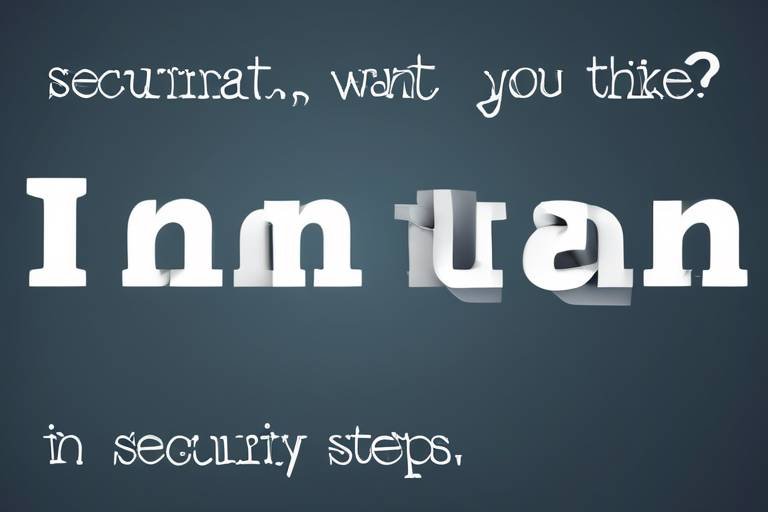How to Choose the Right Cybersecurity Vendor for Your Business
In today's digital age, choosing the right cybersecurity vendor is not just a smart move; it's a necessity. With cyber threats becoming increasingly sophisticated, your business needs a partner that can offer robust protection while ensuring compliance with industry standards. But how do you navigate through a sea of vendors, each claiming to be the best? This article dives deep into the essential factors you need to consider when selecting a cybersecurity vendor, ensuring your business is well-protected from threats while meeting compliance and operational requirements.
Before you even think about contacting vendors, it’s crucial to take a step back and assess your business's specific cybersecurity requirements. Picture your business as a fortress; you wouldn't want to build walls without knowing where the vulnerabilities lie, right? Start by evaluating your current security posture. This means identifying what systems you have in place, where your data is stored, and what sensitive information you need to protect. Consider conducting a risk assessment to pinpoint vulnerabilities that must be addressed by a cybersecurity vendor. This proactive approach not only helps you understand your needs but also enables you to communicate effectively with potential vendors about what you're looking for.
Not all vendors are created equal. When it comes to cybersecurity, you want to ensure you're partnering with a reliable and trustworthy provider. Start by verifying their credentials and certifications. A vendor’s certifications can serve as a strong indicator of their expertise and commitment to best practices. Look for well-known certifications such as ISO 27001 and SOC 2. These certifications demonstrate that a vendor adheres to high standards of information security management.
Understanding various cybersecurity certifications can help you gauge a vendor's expertise. For instance, ISO 27001 is an international standard for managing information security, while SOC 2 focuses on service organizations and how they manage customer data. Having these certifications can give you peace of mind that the vendor is serious about security.
Compliance with industry regulations is vital for cybersecurity vendors. Whether you're in finance, healthcare, or another regulated industry, ensure that your vendor understands and complies with relevant regulations. This not only protects your business but also ensures that you avoid potential legal issues down the road.
A vendor's reputation can significantly impact your security posture. Take the time to research and assess a vendor's track record. Look for customer reviews, case studies, and testimonials. A vendor with a solid reputation is more likely to provide reliable services. Additionally, consider reaching out to other businesses in your network for recommendations. Word-of-mouth can be a powerful tool in identifying trustworthy vendors.
Different vendors offer various services, and it’s essential to evaluate the range of services provided to ensure they align with your business needs. Some vendors may specialize in specific areas, such as threat detection, incident response, or compliance management. Make a list of the services that are crucial for your business and see which vendors can meet those needs. This will help you narrow down your options and find the right fit for your organization.
Cybersecurity services can vary widely in cost, so understanding the pricing models is crucial. Some vendors charge a flat fee, while others may have tiered pricing based on the level of service provided. Be sure to ask about their pricing structure upfront to avoid any surprises later on. This is where understanding the difference between cost and value becomes essential.
It's essential to consider the value provided by a vendor relative to its cost. A cheaper option may seem appealing, but if it doesn’t offer comprehensive protection, you could end up spending more in the long run. Assess the return on investment for cybersecurity services by evaluating what each vendor brings to the table. Are they providing a full suite of services? Are they responsive to your needs? These factors can help you determine if a vendor is worth the investment.
Many vendors have hidden fees that can affect your budget. Be sure to ask about any additional costs that may arise, such as setup fees, maintenance costs, or charges for extra services. Transparency is key; a reputable vendor will be upfront about their pricing and any potential hidden costs. This way, you can avoid any nasty surprises that could derail your budget.
Strong customer support is essential for effective cybersecurity. In the event of a breach or incident, you want to know that help is just a phone call away. Assess the vendor's customer service capabilities by asking about their support hours, response times, and the methods of communication they offer. A vendor that prioritizes customer support will not only help you resolve issues quickly but will also provide peace of mind.
Understanding a vendor's response times during incidents is crucial. Ask about their incident response capabilities and how quickly they can mobilize their team in case of an emergency. A vendor that can respond swiftly can mitigate damage and protect your business from further threats.
Vendor-provided training and resources can enhance your team's cybersecurity awareness. Regular training sessions and access to educational materials can empower your employees to recognize threats and respond effectively. This ongoing education is vital in today’s ever-evolving cyber landscape, where new threats emerge constantly.
- What should I look for in a cybersecurity vendor? Look for certifications, services offered, customer support, and overall reputation.
- Are all cybersecurity vendors the same? No, vendors vary in expertise, services, and pricing structures. It's essential to evaluate them based on your specific needs.
- How important is vendor reputation? Very important! A vendor's reputation can impact your security posture significantly.
- What are common hidden fees? Setup fees, maintenance costs, and charges for additional services are common hidden fees to watch out for.

Understanding Your Security Needs
When it comes to choosing the right cybersecurity vendor, the first step is to thoroughly understand your security needs. Just like a tailor crafting a suit, you need to assess your unique requirements before making a selection. This means taking a good look at your current security posture and identifying any vulnerabilities that could leave your business exposed to threats. Start by asking yourself: What are the specific assets that need protection? Are there sensitive customer data or proprietary information that, if compromised, could lead to significant losses?
Conducting a comprehensive security assessment is crucial. This might involve performing a risk assessment, which helps you pinpoint potential threats and weaknesses within your organization. Consider using the following steps to guide your evaluation:
- Inventory Your Assets: List all critical assets, including hardware, software, and data.
- Identify Vulnerabilities: Analyze where your current security measures may fall short.
- Assess Threats: Consider both internal and external threats that could impact your business.
- Determine Impact: Evaluate the potential impact of a security breach on your operations.
Once you've identified these elements, you can begin to prioritize your security needs. For instance, if you discover that your customer database is at risk due to outdated software, it becomes clear that your vendor should offer robust solutions for data protection and software updates. This tailored approach ensures that you're not just buying a one-size-fits-all solution, but rather a service that addresses your specific vulnerabilities.
Moreover, engaging with stakeholders across your organization can provide additional insights into security needs. This collaboration can help you uncover potential blind spots and ensure that your cybersecurity strategy aligns with your overall business objectives. Remember, effective cybersecurity is not just an IT issue; it’s a business imperative. By understanding your security needs, you can make informed decisions that protect your business and enhance your operational resilience.
In conclusion, understanding your security needs is the foundation for selecting the right cybersecurity vendor. By conducting thorough assessments, prioritizing vulnerabilities, and collaborating with stakeholders, you can ensure that your cybersecurity strategy is both effective and tailored to your business's unique requirements.

Evaluating Vendor Credentials
When it comes to choosing a cybersecurity vendor, credentials matter. You wouldn’t hire a chef without checking their culinary school background, right? The same principle applies here. Evaluating the credentials of potential vendors is crucial to ensuring that they possess the necessary expertise and reliability to protect your business from cyber threats. Start by verifying their certifications and industry reputation, as these factors can significantly influence your security posture.
One of the first steps in evaluating a vendor's credentials is to check their certifications. Certifications are like badges of honor in the cybersecurity world, indicating that a vendor has met specific standards and possesses the necessary skills to handle your security needs. Look for well-recognized certifications such as ISO 27001 and SOC 2. These certifications not only demonstrate a commitment to security best practices but also show that the vendor is serious about maintaining high standards in their operations.
Next, consider the importance of compliance. Different industries have varying regulatory requirements, and your vendor must understand and comply with these regulations. For example, if your business is in the healthcare sector, the vendor must adhere to HIPAA regulations to ensure the protection of sensitive patient information. Compliance not only affects the vendor's operations but also your business's ability to operate legally and securely.
Furthermore, don’t underestimate the impact of a vendor's reputation on your business. A vendor with a stellar reputation is more likely to provide reliable and effective services. Research their track record by reading customer reviews and case studies. Look for testimonials that highlight their strengths and any weaknesses that may have been experienced by other clients. Engaging in conversations with current or past customers can provide invaluable insights. Remember, a vendor's reputation can be the difference between a robust security posture and a vulnerable one.
In summary, evaluating vendor credentials is a multi-faceted process that requires careful consideration. By focusing on certifications, compliance, and reputation, you can make a more informed decision that aligns with your business's cybersecurity needs. After all, in the world of cybersecurity, it’s better to be safe than sorry. So, take the time to do your homework and choose a vendor that you can trust to safeguard your digital assets.
- What certifications should I look for in a cybersecurity vendor?
Look for certifications such as ISO 27001, SOC 2, and PCI DSS, as these indicate a vendor's commitment to security best practices. - How important is vendor reputation?
A vendor's reputation is crucial as it reflects their reliability and effectiveness. Research customer reviews and case studies to gauge their performance. - What role does compliance play in vendor selection?
Compliance is essential as it ensures that the vendor adheres to industry regulations, which can impact your business operations and legal standing.

Checking Certifications
When it comes to selecting a cybersecurity vendor, certifications are a critical aspect that shouldn't be overlooked. Think of these certifications as badges of honor that indicate a vendor's level of expertise and commitment to maintaining high standards in cybersecurity practices. Just like you wouldn't hire a contractor without checking their licenses, you shouldn't engage a cybersecurity vendor without verifying their credentials.
There are numerous certifications available, and understanding which ones matter most can help you make an informed decision. For instance, ISO 27001 is a globally recognized standard that demonstrates a vendor's ability to manage sensitive information securely. This certification shows that the vendor has implemented an information security management system (ISMS) that meets rigorous international standards.
Another important certification to consider is SOC 2, which focuses on a vendor's controls related to security, availability, processing integrity, confidentiality, and privacy of customer data. A vendor with a valid SOC 2 report has undergone an independent audit, providing you with an added layer of assurance regarding their operational practices. You may also encounter certifications like PCI DSS for payment data security and CISSP for individual professionals, which can further validate a vendor's credibility.
It's essential to ask potential vendors about their certifications and to request documentation that proves their compliance. A reputable vendor will be more than willing to share this information with you. Additionally, you can check online databases or official websites to verify these certifications. This step is not just a formality; it could be the difference between a secure partnership and a costly breach.
Furthermore, keep in mind that certifications should not be the sole deciding factor. While they are a significant indicator of a vendor's capabilities, you should also consider their experience, customer feedback, and the specific services they offer. A vendor may have all the right certifications, but if they lack real-world experience or a solid reputation, they might not be the best fit for your business. Therefore, balancing certification checks with other evaluation criteria will lead you to a more reliable cybersecurity partner.
In summary, checking certifications is a vital step in the vendor selection process. It provides you with a clearer picture of their expertise and commitment to maintaining security standards. By ensuring that your chosen vendor holds the necessary certifications, you can rest easier knowing that your business is in capable hands.

Importance of Compliance
When it comes to choosing a cybersecurity vendor, compliance is not just a checkbox—it's a fundamental aspect that can shape your entire security strategy. In today's digital landscape, businesses are subject to a myriad of regulations, such as GDPR, HIPAA, and PCI DSS, that dictate how sensitive information should be handled and protected. Failing to comply with these regulations can lead to severe penalties, reputational damage, and even legal repercussions. Thus, ensuring that your cybersecurity vendor adheres to the necessary compliance standards is crucial for your business's longevity and security.
Moreover, a vendor's commitment to compliance can serve as a litmus test for their overall security posture. Vendors that prioritize compliance are likely to have robust security measures in place, as they are required to meet specific security controls and practices. This not only protects your data but also instills confidence in your stakeholders, clients, and partners, knowing that you are taking the necessary steps to safeguard sensitive information.
It's important to recognize that compliance isn't a one-time effort; it's an ongoing commitment. As regulations evolve and new threats emerge, your cybersecurity vendor must be agile enough to adapt their practices accordingly. Therefore, when evaluating potential vendors, consider asking them about their compliance management processes. Do they regularly update their policies? How do they stay informed about changes in regulations? These questions can help you gauge their dedication to maintaining compliance.
To further illustrate the significance of compliance, here’s a brief overview of how various regulations can impact your choice of vendor:
| Regulation | Key Compliance Requirements | Impact on Vendor Selection |
|---|---|---|
| GDPR | Data protection, user consent, data breach notifications | Choose vendors with strong data handling practices and breach response plans |
| HIPAA | Patient data protection, encryption, access controls | Look for vendors specializing in healthcare security |
| PCI DSS | Secure payment processing, encryption, regular security testing | Select vendors with proven experience in payment security |
In conclusion, compliance is not merely an obligation; it is a critical element that can significantly influence your cybersecurity strategy. By prioritizing vendors that demonstrate a strong commitment to compliance, you not only protect your business from regulatory pitfalls but also enhance your overall security framework. After all, in a world where cyber threats are constantly evolving, being compliant means being proactive and prepared.
- What is compliance in cybersecurity? Compliance in cybersecurity refers to adhering to specific regulations and standards that govern the protection of sensitive data.
- Why is compliance important when choosing a cybersecurity vendor? Compliance ensures that the vendor follows industry standards and best practices, which can mitigate risks and enhance your security posture.
- How can I verify a vendor's compliance? You can ask for certifications, conduct audits, and review their compliance documentation to ensure they meet necessary standards.
- What are some common cybersecurity regulations? Common regulations include GDPR, HIPAA, PCI DSS, and CCPA, each with its own requirements for data protection.

Vendor Reputation
When it comes to choosing a cybersecurity vendor, reputation is everything. Imagine you're in a crowded marketplace, and you want to buy the best product. Wouldn't you ask around for recommendations? The same applies to selecting a cybersecurity partner. A vendor's reputation can significantly impact your security posture, as it reflects their reliability, effectiveness, and overall trustworthiness. So, how do you go about assessing a vendor's reputation in the vast sea of options?
First, start by researching their track record. Look for case studies, testimonials, and client reviews that highlight their successes and any challenges they've faced. You can often find this information on their website, but don't stop there. Dive into third-party review sites and forums where current and former clients share their experiences. These platforms can provide an unfiltered look at how the vendor operates and responds to issues.
In addition to client feedback, consider the vendor's industry recognition. Awards and certifications can serve as indicators of a vendor's standing within the cybersecurity community. For instance, if a vendor has received accolades from respected organizations or has been featured in industry publications, it's a good sign that they're held in high regard.
Another crucial aspect is to evaluate their response to incidents. A reputable vendor should have a transparent incident response plan. Check if they have publicly disclosed any breaches or incidents and how they handled those situations. Did they communicate effectively with their clients? Did they take accountability? Their response can tell you a lot about their commitment to security and customer satisfaction.
Lastly, don't underestimate the power of networking. Reach out to your professional contacts and ask if anyone has worked with the vendor you're considering. Personal recommendations can provide invaluable insights that you won't find in formal reviews.
In summary, assessing a vendor's reputation involves a combination of research, industry recognition, incident response evaluation, and networking. By taking these steps, you can increase your chances of selecting a cybersecurity partner that will not only protect your business but also enhance your overall security posture. Remember, in the world of cybersecurity, a solid reputation is often the best indicator of a vendor's reliability.

Assessing Services Offered
When it comes to choosing a cybersecurity vendor, understanding the services they offer is absolutely pivotal. You wouldn’t buy a car without knowing if it has air conditioning, right? Similarly, you need to ensure that the vendor can provide the specific protections your business requires. Cybersecurity is not a one-size-fits-all solution; different businesses have unique needs based on their size, industry, and existing security measures. Start by identifying your essential security requirements, and then evaluate how each vendor matches up against those needs.
It's important to look at the range of services offered. Some vendors might focus solely on threat detection, while others provide a comprehensive suite of options, including:
- Network Security: Protecting your network from unauthorized access and ensuring data integrity.
- Endpoint Protection: Safeguarding devices like laptops and mobile phones from threats.
- Incident Response: Providing support and strategies in the event of a security breach.
- Compliance Management: Helping you meet industry regulations and standards.
Moreover, consider whether the vendor offers customizable solutions. The ability to tailor services to fit your specific needs can be a game-changer. For instance, if your business handles sensitive customer data, you might need advanced encryption services or regular security audits. A vendor that can adapt its offerings to your requirements can help you maintain a robust security posture.
Another key factor is the integration capabilities of the services offered. Can the vendor's solutions seamlessly integrate with your existing systems? If not, you may end up with a patchwork of security measures that could create vulnerabilities instead of closing them. Ask potential vendors about their compatibility with your current software and hardware. A vendor that offers services compatible with your existing infrastructure will save you time and hassle in the long run.
Finally, don't overlook the importance of ongoing support and updates. Cybersecurity is a constantly evolving field, and threats can change overnight. A vendor that provides regular updates and ongoing support will help ensure that your defenses remain strong against emerging threats. Look for vendors that offer continuous monitoring and proactive threat management as part of their service package.
In summary, assessing the services offered by cybersecurity vendors is about more than just checking boxes. It’s about finding a partner that understands your unique challenges and can provide tailored solutions to protect your business. Remember, the right vendor can make all the difference in keeping your data safe and your operations running smoothly.
Q: How do I know what services my business needs?
A: Start by conducting a thorough assessment of your current security posture. Identify any vulnerabilities and determine the level of protection required based on your industry and data sensitivity.
Q: Can I switch vendors if I'm unhappy with the service?
A: Yes, you can switch vendors, but it's essential to carefully consider the transition process to avoid any security gaps during the changeover.
Q: Are all cybersecurity vendors the same?
A: No, vendors vary significantly in terms of services offered, expertise, and reputation. It's crucial to do your research and choose a vendor that aligns with your specific needs.
Q: What should I do if a vendor has a poor reputation?
A: If a vendor has a poor reputation, it’s best to look elsewhere. Trust is vital in cybersecurity, and you want a partner that has a proven track record of success.

Understanding Pricing Models
When it comes to selecting a cybersecurity vendor, understanding the various pricing models is crucial for effective budgeting and ensuring you get the best bang for your buck. Cybersecurity services can range from a few hundred to thousands of dollars each month, so it's vital to know what you're investing in. The pricing structure can vary significantly based on the services offered, the size of your business, and the complexity of your security needs. It's like shopping for insurance; you want to make sure you’re covered adequately without breaking the bank.
Generally, there are a few common pricing models that vendors might use:
- Flat Fee: This model involves paying a fixed amount for a set of services over a specific period. It’s straightforward and allows for easy budgeting, but it may not cover all your needs as your business grows.
- Hourly Rate: Some vendors charge based on the hours worked. This can be beneficial for businesses that require occasional support but can become expensive if ongoing assistance is needed.
- Tiered Pricing: Vendors often provide different service levels at various price points. This allows businesses to choose a package that best fits their needs and budget.
- Pay-as-You-Go: This flexible model allows businesses to pay only for the services they use. While it can be cost-effective, it requires careful monitoring to avoid unexpected costs.
Understanding these models can help you navigate vendor discussions more effectively. For instance, if you're a small business with limited resources, a flat fee or tiered pricing model might be more suitable. On the other hand, larger organizations with complex needs might benefit from pay-as-you-go or hourly rate models, allowing for tailored support based on real-time requirements.
Moreover, it's essential to consider the total cost of ownership (TCO) when evaluating pricing models. TCO includes not just the initial costs but also ongoing expenses like maintenance, updates, and potential hidden fees. You wouldn’t want to be blindsided by unexpected charges that could derail your budget. Here’s a simple table to illustrate how TCO can vary based on the pricing model:
| Pricing Model | Initial Cost | Ongoing Costs | Total Cost of Ownership |
|---|---|---|---|
| Flat Fee | $1,000 | $0 (fixed) | $1,000/year |
| Hourly Rate | $200 | Varies | Depends on usage |
| Tiered Pricing | $500 | $300/month | $3,600/year |
| Pay-as-You-Go | $100 | Varies | Depends on usage |
Lastly, always ask vendors about hidden fees that could inflate your costs. Many vendors might not disclose these upfront, so it’s essential to have a transparent conversation. Ask about potential charges for additional services, travel expenses, or even penalties for early termination of contracts. It’s like reading the fine print on a loan agreement; you want to be aware of what you’re signing up for!
By understanding the various pricing models and considering the total cost of ownership, you can make an informed decision that aligns with your business goals. Remember, the cheapest option isn’t always the best; it’s about finding the right balance between cost and value!

Cost vs. Value
When it comes to choosing a cybersecurity vendor, understanding the balance between cost and value is essential. You might be tempted to go for the cheapest option, thinking you're saving money. But here's the catch: in the world of cybersecurity, you often get what you pay for. A low-cost vendor may not provide the level of security your business needs, potentially leaving you vulnerable to attacks that could cost you far more in the long run.
So, how do you assess the value that a cybersecurity vendor offers? Start by considering the services they provide. Are they comprehensive enough to cover all aspects of your security needs? For instance, do they offer threat detection, incident response, and compliance management? If a vendor provides a wide range of services that align with your specific requirements, the value they bring to your business may outweigh the initial cost.
Additionally, think about the return on investment (ROI). A vendor that charges a premium might actually save you money over time by preventing costly breaches and ensuring compliance with regulations. To illustrate this point, consider the following table:
| Vendor | Cost (Annual) | Services Offered | Potential Cost of Breach | Estimated ROI |
|---|---|---|---|---|
| Vendor A | $10,000 | Basic Security | $100,000 | -90% |
| Vendor B | $25,000 | Comprehensive Security | $20,000 | +20% |
This table highlights how Vendor A, while cheaper, could lead to significant losses in the event of a security breach compared to Vendor B, which offers a more robust service for a higher price. The key takeaway here is that investing in a quality vendor can actually save you money in the long run.
Another aspect to consider is hidden costs. Some vendors may advertise low prices but then add fees for essential services that should be included. Always ask for a detailed breakdown of costs and ensure you understand what is included in the service. This way, you can avoid unexpected charges that could skew your perception of value.
Ultimately, the goal is to find a cybersecurity vendor that not only fits your budget but also provides a level of service that protects your business effectively. By weighing cost against the potential value and the risks of inadequate security, you can make a more informed decision that will benefit your business in the long term.
- What should I prioritize when selecting a cybersecurity vendor? Focus on their expertise, range of services, and reputation, along with the cost.
- How can I determine if a vendor is worth the investment? Evaluate their ROI based on services offered and potential cost savings from preventing breaches.
- Are hidden fees common in cybersecurity services? Yes, it's essential to clarify all costs upfront to avoid surprises later.
- What certifications should I look for in a vendor? Look for certifications like ISO 27001 and SOC 2, which indicate a strong security framework.

Hidden Fees
When it comes to selecting a cybersecurity vendor, one of the most crucial aspects to consider is the potential for . These sneaky charges can sneak up on you like a shadow in the night, turning what initially seemed like a reasonable budget into a financial nightmare. It's essential to dig deeper and understand the full scope of costs associated with the services you are considering. Many vendors may advertise attractive base prices, but once you dive into the fine print, you might discover additional charges that weren't initially disclosed.
Some common hidden fees that businesses often encounter include:
- Setup Fees: Some vendors may charge you for the initial setup of their services. This can include installation, configuration, and integration costs that you might not have anticipated.
- Maintenance Fees: Ongoing maintenance might come with a price tag, especially if the vendor requires regular updates or monitoring services that aren't included in the base package.
- Training Costs: If your team needs training to effectively use the cybersecurity tools, some vendors charge extra for training sessions or materials.
- Support Fees: While some level of support may be included, premium support services often come at an additional cost. Be sure to clarify what is covered under your contract.
- Termination Fees: If you decide to switch vendors or terminate your contract early, some companies impose hefty fees that can catch you off guard.
To avoid falling into the trap of hidden fees, it's vital to have a transparent discussion with potential vendors about all possible costs. Ask for a detailed breakdown of their pricing model and request clarification on any charges that seem unclear. A trustworthy vendor should be willing to provide you with a comprehensive overview of their pricing structure. Additionally, reading reviews and testimonials from other businesses can give you insights into any unexpected costs they may have encountered.
Ultimately, being proactive about understanding the financial implications of your vendor choice can save you from unpleasant surprises down the road. Just like in a game of chess, anticipating your opponent's moves can lead you to victory. So, stay vigilant and ensure you have a clear picture of what you're signing up for!
Q1: What are hidden fees in cybersecurity services?
A1: Hidden fees are additional costs that may not be explicitly stated in the initial pricing. They can include setup fees, maintenance charges, training costs, and more.
Q2: How can I avoid hidden fees?
A2: To avoid hidden fees, ask vendors for a detailed pricing breakdown, clarify any unclear charges, and read reviews from other customers.
Q3: Are hidden fees common in the cybersecurity industry?
A3: Yes, hidden fees can be common in the cybersecurity industry, so it's essential to be diligent and ask the right questions before signing a contract.

Evaluating Customer Support
When it comes to cybersecurity, having a reliable vendor isn't just about the technology they offer; it's also about the customer support they provide. Imagine you're in the middle of a cyber incident, and you can't reach anyone at your vendor—it's a nightmare scenario, right? That's why evaluating customer support should be a top priority when choosing a cybersecurity vendor. You want to ensure that they are not just a faceless entity but a partner who is there for you when you need them the most.
One of the first things to consider is the availability of support. Does the vendor offer 24/7 support, or are they only available during business hours? In the world of cybersecurity, threats can strike at any moment, and having access to support around the clock can make all the difference. Additionally, look for vendors that provide multiple channels for support, such as phone, email, and live chat. This flexibility can be a lifesaver when you're facing a critical issue.
Another crucial aspect is the response times. When you reach out for help, how quickly can you expect a response? A vendor that takes hours to get back to you may not be the best choice. Ideally, you want a vendor that has a clear Service Level Agreement (SLA) outlining their response times for various types of incidents. This can give you peace of mind knowing that you won't be left hanging in a time of crisis.
Moreover, consider the training and resources that the vendor provides. Cybersecurity is an ever-evolving field, and your team needs to stay updated on the latest threats and best practices. A good vendor will offer training sessions, webinars, and resources to help enhance your team's cybersecurity awareness. This not only empowers your staff but also strengthens your overall security posture.
To help you better evaluate customer support, here’s a quick overview of what to look for:
| Criteria | Importance |
|---|---|
| Availability | 24/7 support can be critical during incidents |
| Response Times | Quick responses can mitigate damage during a breach |
| Training and Resources | Ongoing education helps keep your team prepared |
| Support Channels | Diverse channels ensure you can reach them easily |
In conclusion, when evaluating a cybersecurity vendor, don't overlook the importance of customer support. A vendor that excels in this area can make a significant difference in how effectively your business can respond to threats and maintain compliance. Remember, cybersecurity isn't just about defense; it's about having a partner who can guide you through the challenges of the digital landscape.
- What should I look for in a cybersecurity vendor's customer support?
Look for 24/7 availability, quick response times, and extensive training resources. - How can I assess a vendor's response times?
Check their Service Level Agreements (SLAs) and read customer reviews regarding their responsiveness. - Is training offered by the vendor important?
Yes, ongoing training is crucial for keeping your team updated on the latest cyber threats and practices. - What support channels should a good vendor offer?
A good vendor should provide multiple support channels, such as phone, email, and live chat.

Response Times
When it comes to cybersecurity, time is of the essence. Imagine your business is under attack; every second counts. That's why understanding a vendor's response times is a critical aspect of your selection process. You want a partner who can swiftly react to incidents, minimizing potential damage and ensuring your operations continue without significant disruption. But how do you assess this crucial capability?
First, consider asking potential vendors about their average response times. This information can often be found in their service level agreements (SLAs). A good vendor will provide clear metrics that outline their commitments. For example, they might specify that they will respond to critical incidents within one hour, while less severe issues may have a longer response window. Here's a quick comparison of what you might expect:
| Incident Severity | Expected Response Time |
|---|---|
| Critical | Within 1 hour |
| High | Within 4 hours |
| Medium | Within 1 business day |
| Low | Within 3 business days |
Next, don’t just take their word for it; look for real-world examples and client testimonials that speak to their performance during past incidents. You might ask for case studies or references from existing clients to get a sense of how the vendor handled specific situations. Did they meet their promised response times? Were clients satisfied with how the incidents were managed?
Another critical element to consider is the vendor's support availability. Are they providing 24/7 support, or do they only operate during business hours? If your business runs round-the-clock operations, having a vendor who can respond at any time is essential. You wouldn't want to wait until Monday morning to address a cybersecurity threat that emerged over the weekend, right?
Finally, it’s also beneficial to evaluate the vendor’s incident response team. Are they adequately staffed and trained to handle emergencies? A well-prepared team can make all the difference in a crisis situation. Inquire about their training programs and how often they conduct drills or simulations to stay sharp. A vendor that prioritizes regular training is likely to be more effective when real threats arise.
In summary, when evaluating response times, focus on the following key aspects:
- Average response times as outlined in SLAs
- Real-world performance through testimonials and case studies
- Support availability and hours of operation
- Qualifications and training of the incident response team
By thoroughly assessing these factors, you can ensure that your chosen cybersecurity vendor is not just a good fit on paper, but also a proactive partner in safeguarding your business against threats.
Q1: Why are response times important in cybersecurity?
A1: Response times are crucial because they determine how quickly a vendor can react to a cybersecurity incident, which can significantly reduce damage and downtime for your business.
Q2: What should I look for in a vendor’s service level agreement (SLA)?
A2: Look for clear metrics on response times for different incident severities, support availability, and any penalties for failing to meet those commitments.
Q3: How can I verify a vendor's response times?
A3: Ask for client testimonials, case studies, and specific examples of how they handled past incidents to gauge their reliability.
Q4: Is 24/7 support necessary for all businesses?
A4: Not necessarily, but if your business operates outside regular hours or is particularly vulnerable to attacks, having 24/7 support can be a significant advantage.
Q5: How often should a vendor conduct training and simulations?
A5: Regular training and simulations should be part of a vendor's routine, ideally conducted quarterly or bi-annually, to keep their team sharp and prepared for real threats.

Training and Resources
In today's fast-paced digital landscape, cybersecurity is not just a one-time setup; it's an ongoing journey. When selecting a cybersecurity vendor, one crucial aspect to consider is the they provide. Imagine your team as a ship sailing through treacherous waters—without the right training and tools, it’s easy for them to become lost or overwhelmed by the waves of cyber threats. A vendor that offers comprehensive training programs equips your crew with the necessary skills to navigate these challenges effectively.
So, what should you look for in terms of training and resources? First and foremost, assess whether the vendor provides ongoing training sessions that keep your team updated on the latest threats and mitigation strategies. Cybersecurity is constantly evolving, and staying ahead of potential risks is vital. A vendor that prioritizes education can transform your staff into a proactive defense force rather than a reactive one.
Additionally, consider the type of resources the vendor offers. Are there online courses, webinars, or workshops available? Do they provide access to a knowledge base filled with articles, case studies, and best practices? All these resources can significantly enhance your team’s ability to respond to incidents effectively. For instance, a well-structured training program might include:
- Interactive workshops on threat detection
- Simulated phishing attacks to practice response
- Regular updates on new malware and vulnerabilities
Moreover, don’t underestimate the value of support materials. These can include guides, checklists, and even videos that your team can refer to when needed. Having these resources at their fingertips can empower your employees to act swiftly and confidently in the face of a cyber incident.
Finally, it’s essential to evaluate how the vendor approaches team engagement. Are they willing to customize training sessions to address your specific business needs? A one-size-fits-all approach may not be sufficient, especially if your organization operates in a niche industry with unique security challenges. A vendor that takes the time to understand your business can tailor their training programs to ensure maximum effectiveness.
In conclusion, when it comes to cybersecurity, the right training and resources can be the difference between a successful defense and a devastating breach. By investing in a vendor that prioritizes ongoing education and provides valuable resources, you’re not just protecting your business; you’re empowering your team to be the first line of defense against cyber threats.
Q1: Why is training important for cybersecurity?
A: Training is essential because it equips employees with the knowledge and skills to recognize and respond to cyber threats, thereby reducing the risk of breaches.
Q2: What types of training should I look for in a vendor?
A: Look for vendors that offer interactive workshops, simulated attacks, and regular updates on new threats to keep your team informed and prepared.
Q3: Can training be customized for my business?
A: Yes, many vendors offer customized training programs tailored to your specific industry and security needs.
Frequently Asked Questions
-
What factors should I consider when choosing a cybersecurity vendor?
When selecting a cybersecurity vendor, it's important to evaluate your specific security needs, assess the vendor's credentials and certifications, understand their pricing models, and check their customer support capabilities. Each of these factors plays a crucial role in ensuring that the vendor can adequately protect your business from cyber threats.
-
How do I assess my business's cybersecurity needs?
Assessing your cybersecurity needs involves evaluating your current security posture, identifying vulnerabilities, and understanding the regulatory requirements specific to your industry. Conducting a thorough risk assessment can help you pinpoint areas that require immediate attention and tailor your vendor search accordingly.
-
Why is it important to check a vendor's certifications?
Checking a vendor's certifications is vital because it demonstrates their expertise and commitment to industry standards. Certifications like ISO 27001 and SOC 2 can provide assurance that the vendor follows best practices in cybersecurity, which is essential for protecting your sensitive data.
-
What should I know about compliance when choosing a vendor?
Compliance is crucial as it ensures that your vendor adheres to industry regulations and standards. Non-compliance can lead to legal issues and financial penalties. Understanding the compliance requirements specific to your business will help you select a vendor that meets these obligations.
-
How can I evaluate a vendor's reputation?
To evaluate a vendor's reputation, research their track record, read customer reviews, and look for case studies that demonstrate their success in providing cybersecurity solutions. Engaging with other businesses in your industry can also provide valuable insights into the vendor's reliability and effectiveness.
-
What pricing models should I expect from cybersecurity vendors?
Cybersecurity vendors typically offer various pricing models, including subscription-based, pay-as-you-go, and tiered pricing. Understanding these models will help you budget effectively and choose a vendor that aligns with your financial capabilities while still delivering quality services.
-
Are there hidden fees I should be aware of?
Yes, many vendors have hidden fees that can impact your overall budget. Common hidden costs include setup fees, charges for additional services, and costs for exceeding usage limits. It's important to clarify all potential fees upfront to avoid surprises later on.
-
Why is customer support important in cybersecurity?
Strong customer support is essential in cybersecurity because timely assistance can be critical during a security incident. A vendor with responsive support can help you quickly mitigate threats and reduce potential damage to your business.
-
How can I assess a vendor's incident response capabilities?
To assess a vendor's incident response capabilities, inquire about their response times, the processes they have in place for handling incidents, and the availability of their support team. Understanding their approach to incident management will give you confidence in their ability to protect your business.
-
What role does vendor-provided training play in cybersecurity?
Vendor-provided training is crucial for enhancing your team's cybersecurity awareness. Regular training sessions can help your staff recognize potential threats and respond effectively, thereby strengthening your overall security posture.



















